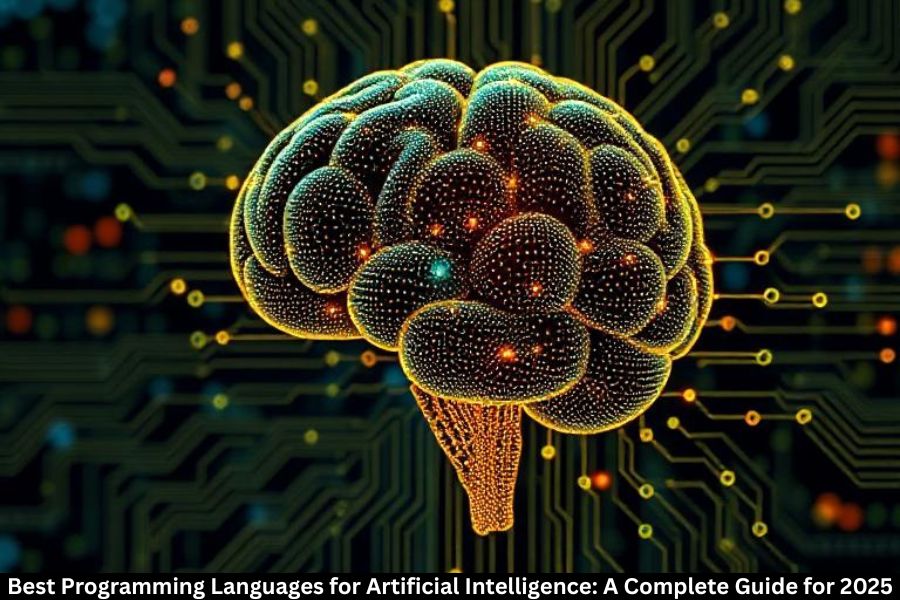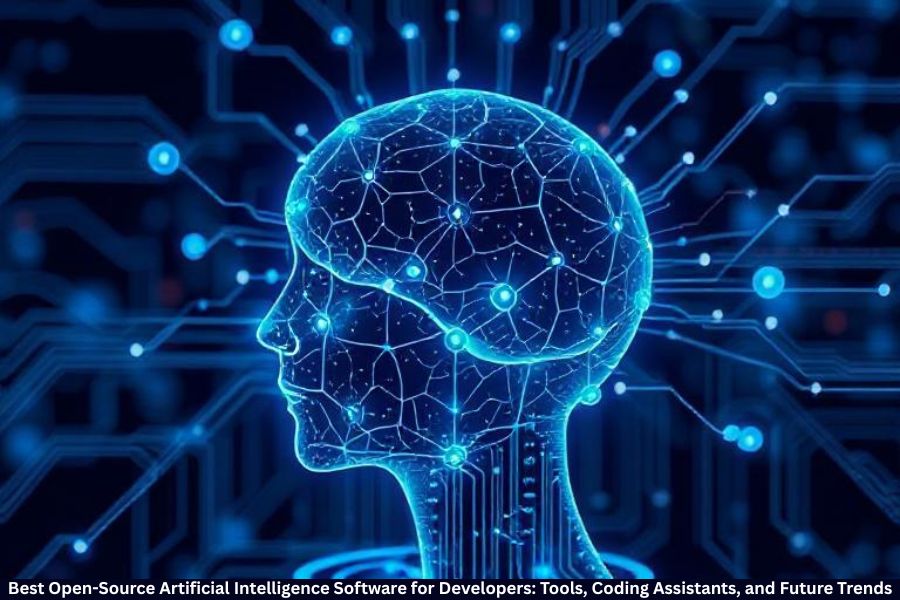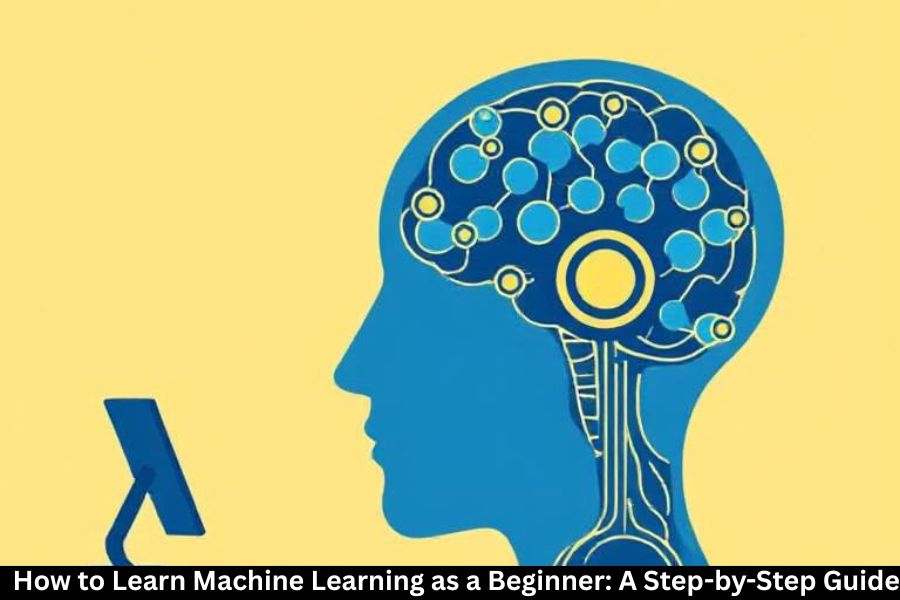Artificial intelligence (AI) has been termed “modern technology.” Think about self-driving cars and voice assistants such as Siri and Alexa-these are addressing AI. Have you ever stopped to think about what propels these intelligent systems? Programming languages-achieving the smooth running of an AI project relies very much on the choice of language.
Let’s go on and discuss the best AI programming languages and try to answer some common questions along the way.
What Makes a Good Programming Language for AI
There are so many programming languages in the world; by contrast, few good ones are for AI. The best languages for AI will typically have:
- Ease of use and readability → A beginner-friendly syntax accelerates development.
- Library and framework support → The tools are paramount for machine learning and deep learning.
- Performance and scalability → Heavy computation is usually required for AI, so the performance-landscape is important.
- Community and ecosystem → A huge active community means always there is someone to provide support and apart from this, there are loads of resources.
Python: The King of AI Programming
Python is king in the realm of AI.
- The reasons Python dominates AI are because it is simple and readable, with a huge ecosystem of AI and machine learning libraries.
- Some of the key libraries are TensorFlow, PyTorch, Keras, scikit-learn, NumPy, Pandas – the unbeatable combination for AI.
- Beginner-friendly: It is easy to learn Python if a person has never coded before.
Hence, Python is the number one language being used in AI.
R: The Language of Data Science and Statistics
R is still a challenger in AI, especially on projects involving an intense amount of data, while Python is king.
- It is great for statistical analysis and data visualization.
- It has been mostly used in academic and research environments.
- Some popular library names are caret, randomForest, and ggplot2.
If your AI project expects a high outward tilt toward mathematical modeling and data analysis, R will be the language for you.
C++: AI Programming with Performance Oriented
While it may not be as friendly for beginners as Python, C++ is really the workhorse language of AI.
- It’s applied in robotics, game development, and real-time AI systems.
- It allows for more control over memory and execution speed.
- It is also one of the best languages for creating hardware AI systems.
Should I use Python or C++ for AI?
If you want to work on fast, real-time AI systems, for example, self-driving cars or game engines, C++ is the way to go. But in cases of research projects, prototyping, and deep learning, Python will usually have the edge.
Java: Stability and Scalability
Another popular AI language is Java, mainly in business environments.
- It is known for its portability and scalability.
- It is used in fraud detection and enterprise chatbot large-scale AI systems.
- Favourite libraries: Deeplearning4j, Weka, and MOA.
The downside is that it isn’t as flexible and user-friendly as Python.
LISP: The Original AI Language
Ever wonder, Who is the father of AI? It’s John McCarthy, and he invented LISP, one of the earliest AI languages.
- Great for rapid prototyping and symbolic reasoning.
- It has been famed for its flexibility and extra-features.
- Though stone rarely seen today, it did have a major hand in shaping AI.
Prolog: Logic-based AI Programming
Prolog (Programming in Logic) is just another of the early AI languages.
- It is great for rule-based AI systems and natural language processing.
- It is still used in expert systems whenever logic and reasoning are required.
- Although it is less considered nowadays in AI, it is quite influential.
Julia: High-Level Performance Computing for AI
Julia is rising in the field of AI.
- It has the ease of Python and speed of C++.
- Great for scientific computing and machine learning research.
- The ones who have to really perform and crunch data are just loving it.
JavaScript: Web AI
JavaScript sneaking into an AI space?
- TensorFlow.js has allowed Machine learning models to be run within the browser.
- Good for AI-empowered web apps, such as recommendation systems and chatbots.
- Great for any front-end developer stepping into AI.
Which Programming Language Is Best for AI?
That depends on the goals:
- Python → The all-rounder.
- R → For data analysis and research.
- C++ → For performance-heavy AI, such as robotics.
- Java → For enterprise applications.
- Julia → For high-performance scientific AI.
Which Language Is Used in AI?
Well, generally speaking: Python.
Almost every AI survey confirms Python as the leading language, owing to its libraries and easy syntax.
Who Is the Father of AI?
The title goes to John McCarthy, who coined the term “Artificial Intelligence” in 1956 and developed LISP, one of the first AI languages.
What Language Is ChatGPT Written In?
OpenAI’s ChatGPT is written mostly in Python and uses PyTorch and TensorFlow libraries for deep learning.
Behind the scenes, other languages like C++ and CUDA are used for performance optimizations.
Future of Programming Languages in AI
- Python will stay number one for AI for some time to come.
- While Julia and Rust can gain ground, the performance requirements will grow.
- At a very complex level, AI projects will steer towards multi-language hybrid systems.
Conclusion
Selecting the most suited programming language for AI depends on the project settings, goals, and personal interests. Python appears to be suitable for the majority of people. If speed is a concern, nothing beats C++. R goes well with statistics-heavy projects. And if you like adventure, try Julia and Prolog.
Fast as-ing developments thus go for AI, and the programming languages go along with it. Regardless of whatever language you pick, what matters is that you start building, experimenting, and learning.
FAQs
Which programming language should one begin with?
Python is nice for beginners because of simple syntax and plenty of AI libraries.
What language in the fastest for AI?
Among the fastest are C++ and Julia and turning great for real-time AI.
Which language is best for robotics AI?
C++ is often used in robotics for its speed and hardware control.
Is AI possible without coding?
Yes, no-code AI is possible with platforms like Google AutoML and Microsoft Azure AI, but coding provides options.
What languages should I watch for in the future of AI?
Julia and Rust contend with Python as emerging candidates.


